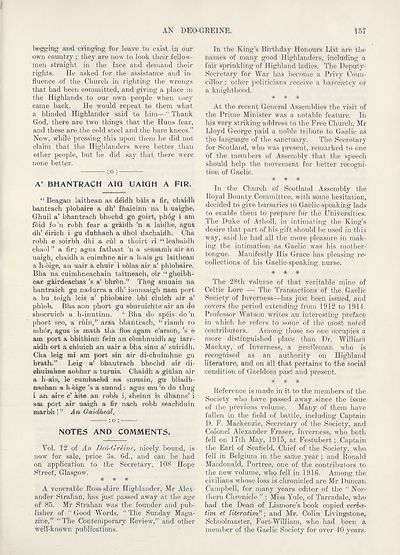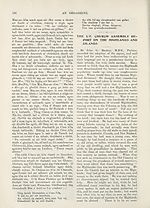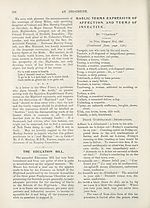An Comunn Gàidhealach Publications > Deo-gréine > Volume 13, October 1917-September 1918
(165) Page 157
Download files
Complete book:
Individual page:
Thumbnail gallery: Grid view | List view

AN DEO-GREINE.
157
begging and cringing for leave to exist in our
own country ; they are now to look their fellow-
men straight in the face and demand their
rights. He asked for the assistance and in¬
fluence of the Church in righting the wrongs
that had been committed, and giving a place in
the Highlands to our own people when mey
came back. He would repeat to them what
a blinded Highlander said to him—“ Thank
God, there are two things that the Huns fear,
and these are the cold steel and the bare knees.”
Now, while pressing this upon them he did not
claim that the Highlanders were better than
other people, but he did say that there were
none better.
A’ BHANTRACH AIG UAIGH A FIR.
“ Beagan laithean as d&dh Mis a fir, chaidh
bantrach plobaire a dh’ fhaioinn na h uaighe.
Ghuil a’ bhantrach bhochd gu goirt, phog i am
foid fo’n robh fear a grindh ’n a laidhe, agus
dh’ fiirich i gu dubhach a dhol dachaidh. Cha
robh e soirbh dhi a cul a thoirt ri “ leabaidh
chaol ” a fir; agus fathast ’n a seasamh air an
uaigh, chaidh a cuimhne air a ii-ais gu laithean
a h-oige, an uair a chuir i eblas air a’ phiobaire.
Bha na cuimhneachain taitneach, oir “ gheibh-
ear giurdeachas’s a’ bhron.” Thog smuain na
bantraich gu nadurra a dh’ ionnsaigh nam port
a bu toigh leis a’ phiobaire bhi cluich air a’
phlob. Bha aon phort gu sbnruichte air an do
shocruich a h-inntinn. Bha do speis do ’n
phort seo, a rfiin,” arsa bhantrach, “ riamh ro
in heir, agus is math fcha fios agam c’afson, ’s e
am port a bhitbinn fein an cbmlmuidh ag iarr-
aidh ort a chluich an uair a bha sinn a’ sniridh.
Cha leig mi am port sin air di-chuimhne gu
brath.” Leig a’ bhantrach bhoebd air di-
ehuimbne aobhar a turuis. Chaidh a giulan air
a h-ais, le cumhachd na smuain, gu bliadh-
nachan a h-bige’s a sunnd ; agus mu ’n do thug
i an aire e’ aite an robh i, sheinn is dhanns’ i
am port air uaigh a fir nach robh seachduin
marbh ! ” An Getidheal.
NOTES AND COMMENTS.
Tol. 12’ of An Ded-Greine, nicely bound, is
now for sale, price 3s. 6d., and can be had
on application to the Secretary, 108 Hope
Street, Glasgow.
* * #
A venerable Ross-shire Highlander, Mr Alex¬
ander Strahan, has just passed away at the age
of 85. Mr Strahan was the founder and pub¬
lisher of “ Good Words, “ The Sunday Maga¬
zine,” “ The Contemporary Review,” and other
well-known publications.
In the King’s Birthday Honours List are the
names of many good Highlanders, including a
fair sprinkling of Highland ladies. The Deputy-
Secretary for War has become a Privy Coun¬
cillor; other politicians receive a baronetcy or
a knighthood.
At the recent General Assemblies the visit of
the Prime Minister was a notable feature. In
his very striking address to the Free Church, Mr
Lloyd George paid a noble tribute to Gaelic as
the language of the sanctuary. The Secretary
for Scotland, who was present, remarked to one
of the members of Assembly that the speech
should help the movement for better recogni¬
tion of Gaelic.
* * *
In the Church of Scotland Assembly the
Royal Bounty Committee, with some hesitation,
decided to give bursaries to Gaelic-speaking lads
to enable them to prepare for the Universities.
The Duke of Atholl, in intimating the King’s
desire that part of his gift should be used in this
way, said he had all the more pleasure in mak¬
ing the intimation as Gaelic was his mother-
tongue. Manifestly His Grace has pleasing re¬
collections of his Gaelic-speaking nurse.
The 28th volume of that veritable mine of
Celtic Lore — The Transactions of the Gaelic
Society of Inverness—has just been issued, and
covers the period extending from 1912 to 1914.
Professor Watson writes an interesting preface
in which he refers to some of the most noted
contributors. Among those no One Occupies a
more distinguished place than Dr. Williami
Mackay, of Inverness, a gentleman who is
recognised as an authority On Highland
literature, and on all that pertains to the social
condition of Gaeldom past and present.
* * *
Reference is made in it to the members of the
Society who have passed away since the issue
of the previous volume. Many of them have
fallen in the field of battle, including Captain
D. F. Mackenzie, Secretary of the Society, and
Colonel Alexander Fraser, Inverness, who both
fell on 17th May, 1915, at Festubert; Captain
the Earl of Seafield, Chief of the Society, who
fell in Belgium in the same year; and Ronald
Macdonald, Portree, one of the contributors to
the new volume, who fell in 1916. Among the
civilians whose loss is chronicled are Mr Duncan
Campbell, for many years editor of the “ Nor¬
thern Chronicle ” ; Miss Yule, of Tarradale, who
had the Dean of Lismore’s book copied verba¬
tim et literatim”-, and Mr. Colin Livingstone,
Schoolmaster, FortrWilliam, who had been a
member of the Gaelic Society for over 40 years.
157
begging and cringing for leave to exist in our
own country ; they are now to look their fellow-
men straight in the face and demand their
rights. He asked for the assistance and in¬
fluence of the Church in righting the wrongs
that had been committed, and giving a place in
the Highlands to our own people when mey
came back. He would repeat to them what
a blinded Highlander said to him—“ Thank
God, there are two things that the Huns fear,
and these are the cold steel and the bare knees.”
Now, while pressing this upon them he did not
claim that the Highlanders were better than
other people, but he did say that there were
none better.
A’ BHANTRACH AIG UAIGH A FIR.
“ Beagan laithean as d&dh Mis a fir, chaidh
bantrach plobaire a dh’ fhaioinn na h uaighe.
Ghuil a’ bhantrach bhochd gu goirt, phog i am
foid fo’n robh fear a grindh ’n a laidhe, agus
dh’ fiirich i gu dubhach a dhol dachaidh. Cha
robh e soirbh dhi a cul a thoirt ri “ leabaidh
chaol ” a fir; agus fathast ’n a seasamh air an
uaigh, chaidh a cuimhne air a ii-ais gu laithean
a h-oige, an uair a chuir i eblas air a’ phiobaire.
Bha na cuimhneachain taitneach, oir “ gheibh-
ear giurdeachas’s a’ bhron.” Thog smuain na
bantraich gu nadurra a dh’ ionnsaigh nam port
a bu toigh leis a’ phiobaire bhi cluich air a’
phlob. Bha aon phort gu sbnruichte air an do
shocruich a h-inntinn. Bha do speis do ’n
phort seo, a rfiin,” arsa bhantrach, “ riamh ro
in heir, agus is math fcha fios agam c’afson, ’s e
am port a bhitbinn fein an cbmlmuidh ag iarr-
aidh ort a chluich an uair a bha sinn a’ sniridh.
Cha leig mi am port sin air di-chuimhne gu
brath.” Leig a’ bhantrach bhoebd air di-
ehuimbne aobhar a turuis. Chaidh a giulan air
a h-ais, le cumhachd na smuain, gu bliadh-
nachan a h-bige’s a sunnd ; agus mu ’n do thug
i an aire e’ aite an robh i, sheinn is dhanns’ i
am port air uaigh a fir nach robh seachduin
marbh ! ” An Getidheal.
NOTES AND COMMENTS.
Tol. 12’ of An Ded-Greine, nicely bound, is
now for sale, price 3s. 6d., and can be had
on application to the Secretary, 108 Hope
Street, Glasgow.
* * #
A venerable Ross-shire Highlander, Mr Alex¬
ander Strahan, has just passed away at the age
of 85. Mr Strahan was the founder and pub¬
lisher of “ Good Words, “ The Sunday Maga¬
zine,” “ The Contemporary Review,” and other
well-known publications.
In the King’s Birthday Honours List are the
names of many good Highlanders, including a
fair sprinkling of Highland ladies. The Deputy-
Secretary for War has become a Privy Coun¬
cillor; other politicians receive a baronetcy or
a knighthood.
At the recent General Assemblies the visit of
the Prime Minister was a notable feature. In
his very striking address to the Free Church, Mr
Lloyd George paid a noble tribute to Gaelic as
the language of the sanctuary. The Secretary
for Scotland, who was present, remarked to one
of the members of Assembly that the speech
should help the movement for better recogni¬
tion of Gaelic.
* * *
In the Church of Scotland Assembly the
Royal Bounty Committee, with some hesitation,
decided to give bursaries to Gaelic-speaking lads
to enable them to prepare for the Universities.
The Duke of Atholl, in intimating the King’s
desire that part of his gift should be used in this
way, said he had all the more pleasure in mak¬
ing the intimation as Gaelic was his mother-
tongue. Manifestly His Grace has pleasing re¬
collections of his Gaelic-speaking nurse.
The 28th volume of that veritable mine of
Celtic Lore — The Transactions of the Gaelic
Society of Inverness—has just been issued, and
covers the period extending from 1912 to 1914.
Professor Watson writes an interesting preface
in which he refers to some of the most noted
contributors. Among those no One Occupies a
more distinguished place than Dr. Williami
Mackay, of Inverness, a gentleman who is
recognised as an authority On Highland
literature, and on all that pertains to the social
condition of Gaeldom past and present.
* * *
Reference is made in it to the members of the
Society who have passed away since the issue
of the previous volume. Many of them have
fallen in the field of battle, including Captain
D. F. Mackenzie, Secretary of the Society, and
Colonel Alexander Fraser, Inverness, who both
fell on 17th May, 1915, at Festubert; Captain
the Earl of Seafield, Chief of the Society, who
fell in Belgium in the same year; and Ronald
Macdonald, Portree, one of the contributors to
the new volume, who fell in 1916. Among the
civilians whose loss is chronicled are Mr Duncan
Campbell, for many years editor of the “ Nor¬
thern Chronicle ” ; Miss Yule, of Tarradale, who
had the Dean of Lismore’s book copied verba¬
tim et literatim”-, and Mr. Colin Livingstone,
Schoolmaster, FortrWilliam, who had been a
member of the Gaelic Society for over 40 years.
Set display mode to:
![]() Universal Viewer |
Universal Viewer | ![]() Mirador |
Large image | Transcription
Mirador |
Large image | Transcription
| An Comunn Gàidhealach > An Comunn Gàidhealach Publications > Deo-gréine > Volume 13, October 1917-September 1918 > (165) Page 157 |
|---|
| Permanent URL | https://digital.nls.uk/125234081 |
|---|
| Description | Leabhar 13, Mìos Deireannach an Fhogharaidh 1917 gu Darna Mìos an Fhogharaidh 1918 |
|---|---|
| Attribution and copyright: |
|
| Description | This contains items published by An Comunn, which are not specifically Mòd-related. It includes journals, annual reports and corporate documents, policy statements, educational resources and published plays and literature. It is arranged alphabetically by title. |
|---|
| Description | A collection of over 400 items published by An Comunn Gàidhealach, the organisation which promotes Gaelic language and culture and organises the Royal National Mòd. Dating from 1891 up to the present day, the collection includes journals and newspapers, annual reports, educational materials, national Mòd programmes, published Mòd literature and music. |
|---|---|
| Additional NLS resources: |
|

